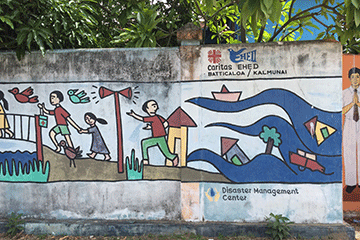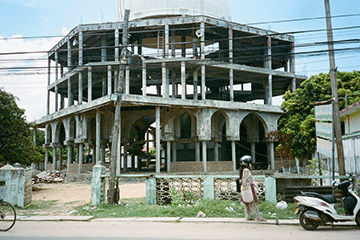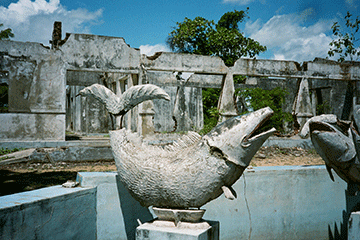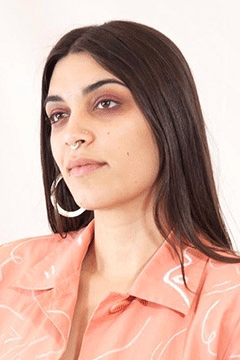
02/08/2022
A “mega catastrophe” is a disaster of almost unimaginable proportions.
Think, for example, of 2004’s Indian Ocean tsunami, which killed an estimated 227,898 people in 14 countries, making it one of the deadliest cataclysms in recorded history. The plight of the affected people prompted a worldwide humanitarian response, with donations totaling more than $14 billion U.S. dollars.
Elizabeth Bittel, an assistant professor of sociology at SUNY Cortland, specializes in studying how humans endure this kind of massive devastation, whether from wars or the “natural” elements, which scientists are blaming for more than a few disasters.
“As we move toward a more unstable global climate with an increased risk for ecological destruction, lessons from complex humanitarian emergencies are more prescient than ever,” Bittel said.

Bittel will lecture on “(Re)Making Home on Shifting Sands: Lessons from Post-Catastrophe Corrosive Communities” on Wednesday, Feb. 23, at SUNY Cortland.
Her talk, which will take place at 4:30 p.m. in Moffett Center, Room 115, continues the 2021-22 Rozanne M. Brooks Lecture Series of talks or poster sessions at SUNY Cortland, which this academic year focuses on the theme of “The Culture of Extremes.”
A reception to welcome Bittel will start at 4 p.m. in the Rozanne M. Brooks Museum, Moffett Center, Room 116.
The Brooks Museum lectures and receptions are free. Due to continued health and safety concerns surrounding the pandemic, members of the public are not invited. Seating will be limited and cannot be exceeded. The presentations all take place on Wednesdays and begin at 4:30 p.m. in Moffett Center, Room 115. Events in the series are subject to change.
Bittel, who also serves as a visiting scholar in the South Asia Program at Cornell University, has focused her scholarship on the sociology of environment, social dimensions of disasters and hazards, environmental justice and ethnographic methods and Sri Lanka.

Lately she has used ethnographic data she collected from communities in the Batticaloa region of Sri Lanka, one of the hardest-hit countries by the Indian Ocean tsunami, to study how its people have experienced recovery some 18 years after the mega earthquake-linked disaster. Sri Lankans also endured on- and off-again violent civil conflict between the Sinhalese government and Tamil separatists for nearly 30 years, with the war officially ending in 2009.
Bittel has observed how the process of rebuilding physical infrastructure is shaped by actors and institutions that co-produce social cohesion or corrosion, both of which flourish throughout the lifecycle of disasters. So communities pulling together or dividing can make the difference between a successful or an unsuccessful recovery.
“This work interrogates how power flows through institutions and communities seeking to rebuild their homes on shifting sands,” Bittel said of her ongoing work to theorize “disaster recovery.”
“And, in doing so, critiques the popular ‘build back better,’ resilient-community narrative by troubling our understandings of what exactly ‘recovery’ is, who it is for, and how it happens.”
Born in Key West, Bittel was raised in South Florida and earned a Bachelor of Arts in Sociology and Social Welfare, summa cum laude, at the University of North Florida in Jacksonville.
While earning a Ph.D. in sociology at the University of Colorado Boulder (UCB) in 2019, she focused her research on environmental sociology and worked as a graduate research assistant and the internship coordinator at the UBC’s Natural Hazards Center at the Institute of Behavioral Science.

In 2017, she was awarded a Foreign Language and Area Studies Fellowship from the American Institute for Indian Studies and Institute for Regional Studies at University of Wisconsin to attend a Tamil language intensive institute in Madurai, India. Bittel also received an American Institute for Sri Lankan Studies Curriculum Development Grant: Teaching About the 2004 Tsunami.
Bittel has developed a teaching module for the American Institute for Sri Lankan Studies titled “Teaching About the 2004 Tsunami.”
She co-authored a book chapter on how children offered a bottom-up response after Hurricane Katrina for a forthcoming book The Potential for Bottom-Up Responses to Crisis (London: Palgrave Macmillan).
The “Culture of Extremes” series addresses how in the last couple years, America and the rest of the world have been wracked by extremes that include political brinksmanship, apocalyptic weather events, deadly pandemic, economic collapse and social upheaval.
Two additional talks will be announced later this spring.
The 2021-22 Brooks Lecture Series is sponsored by a grant from the Cortland College Foundation, the Sociology/Anthropology Department and the President’s Office. For more information, contact Brooks Museum director and SUNY Distinguished Professor Sharon Steadman at 607-753-2308.